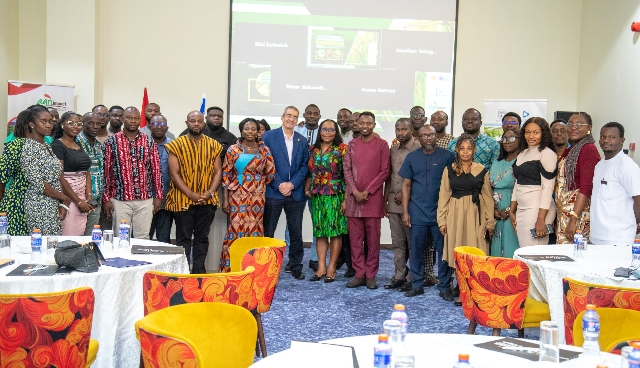Agri-Impact and Israeli Embassy host agribusiness innovation forum in Accra
 Participants in a group photograph after the event
Participants in a group photograph after the event
Leading agribusiness firm, Agri-Impact Limited, in collaboration with the Embassy of Israel in Ghana, convened an Agribusiness Innovation Forum on Thursday, July 31, 2025, at the Palms Hotel in Accra, aimed at driving technological innovations into Ghana’s poultry and rice value chains.
The forum brought together key stakeholders, agribusiness leaders, and Israeli technology providers to explore scalable innovations that address persistent challenges in Ghana’s agricultural sector. It was held under the theme: “Bridging Technology and Opportunity in Ghana’s Rice and Poultry Value Chains.”
Delivering the keynote address, Juliana Asante-Dartey, Deputy CEO of Agri-Impact Limited, highlighted the relevance of the event, describing it as “a critical moment of alignment between Ghana’s aspirations for food self-sufficiency and Israel’s global leadership in agricultural innovation.”
She stressed that Ghana’s rice and poultry sectors remain hampered by outdated practices, low productivity, and heavy dependence on imports, despite agriculture being the backbone of the economy.
In 2024 alone, Ghana spent approximately GH₵38.9 billion on food imports, including nearly GH₵3 billion on rice and GH₵2.6 billion on frozen poultry products—figures that represent lost revenue, jobs, and opportunities for local growth.
“In the rice sector, our farmers—mostly smallholders—struggle with poor irrigation, inefficient pest and disease control, and inefficient milling techniques,” Mrs. Asante-Dartey noted.
While Israel averages 8 to 10 tonnes of rice per hectare, Ghana’s yields remain at 2.5 to 4.5 tonnes, with rice imports projected to reach 950,000 tonnes in the 2024/2025 season.
She further revealed that local broiler meat production covers less than 20% of national demand, with a chunk of poultry meat imported, largely due to high feed costs, limited disease control systems, and weak cold-chain and processing infrastructure.
This imbalance, she warned, leaves Ghana’s food systems vulnerable to global shocks.
“Israeli agritech offers game-changing solutions—from smart irrigation and AI-driven pest control to mechanised harvesting, advanced milling, and climate-smart poultry housing,” she said.
“These technologies can significantly improve yields, reduce post-harvest losses, and enhance the competitiveness of local products.”
The Deputy Agri-Impact CEO also highlighted the Harnessing Agricultural Productivity and Prosperity for Youth (HAPPY) Program, a flagship initiative of the Mastercard Foundation in partnership with Agri-Impact Limited and eight implementating partners, which aims to create over 326,000 dignified and fulfilling work opportunities for youth, women, and persons with disabilities across the rice, soybean, tomato, and poultry value chains.
Since its launch in October 2023, the program has already facilitated over 192,000 jobs across the four targeted value chains. Of this, rice and poultry alone account for more than 140,000 jobs.
“The HAPPY Program is already achieving significant traction across Ghana, but to achieve scale and sustainability, we need collaboration—especially in deploying the right technologies. That’s why this forum matters. We aim to deepen technology transfer, strengthen bilateral trade and investment, and fast-track inclusive job creation through meaningful partnerships.”
Also addressing the gathering, Israeli Ambassador to Ghana, H.E. Roey Gilad, expressed his excitement about the opportunity to introduce Israel’s cutting-edge agricultural technologies to Ghana.
He emphasised Israel’s global reputation as a “startup nation,” noting that despite harsh conditions, the country consistently innovates to feed its population and contribute to global food systems.
Demonstrating this potential, four leading Israeli agritech firms—CropX, Metzer, AgroScout, and Plasson—took turns to present their innovative solutions to Ghanaian stakeholders.
Their presentations showcased advanced technologies designed to tackle pressing challenges in Ghana’s agricultural space, including smart irrigation systems, AI-powered crop monitoring, precision farming tools, and innovative poultry production infrastructure.
There was also a Business-to-Business (B2B) session, which gave stakeholders the opportunity to directly engage with the four Israeli agritech firms to explore tailored solutions for their respective agribusiness activities.
The event signals a deepening collaboration between Ghana and Israel in agribusiness innovation, with the promise of deploying proven technologies to catalyse growth, create jobs, and build resilience across Ghana’s food value chains.
Source: Classfmonline.com/Cecil Mensah
Trending Business

Minority ‘exposes’ Finance Minister on misleading information in Mid-Year Budget presentation
13:35
Strip NPA of fund management duties -CEMSE and RMA demand
08:41
True value of a currency lies in its purchasing power, not exchange rate – Gideon Boako to Ato Forson
08:05
GRA Customs boss warns corrupt officials, vows to protect revenue integrity
05:02
Ghana receives 2,000 tons of Fertilisers from Morocco to boost agriculture
02:08
DVLA to go fully digital with sticker-only DP numbers at ports from August 1
15:21
DVLA partners SIC Insurance to introduce insurance cover for DP car plates
17:16
Fueling Africa’s future: How Rik Energy plans to penetrate West and East African markets
14:19
Ato Forson uncovers 14,000 ghost names on gov't payroll
11:43
IMF endorses measures announced in Mid-year Budget Review
07:23



